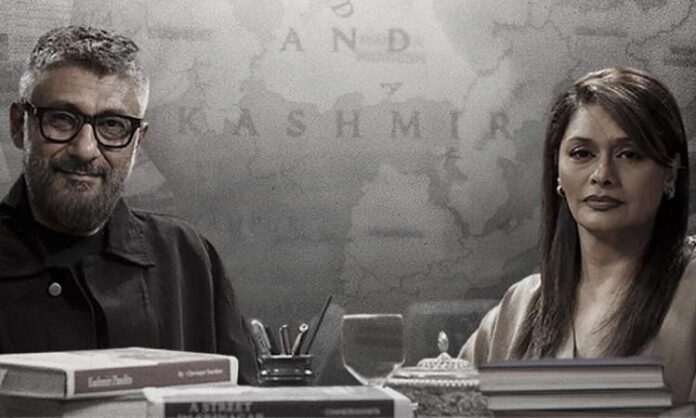An apparent fallacy pertinent to Christopher Nolan’s films is that physics aficionados would have an advantage in comprehending his cinematic world. But honestly, no one needs to dust their physics knowledge to enjoy a Nolan film. But when proclaiming a film is based on historical facts, one can’t help but wonder if weaving a fictional narrative is enough to overamplify facts. The Kashmir Files (2022) was criticised for “mining a real tragedy for sickening rhetoric.” This time around, with The Kashmir Files Unreported, filmmaker Vivek Agnihotri and actor Pallavi Shah come up with what seems like a substantiation for The Kashmir Files but ends up as a confounding mess.
Director: Vivek Agnihotri
Cast: Vivek Agnihotri, Pallavi Joshi
Streamer: Zee5
The Kashmir Files Unreported is a documentary series that sheds light on the intricate process of making the 2022 film, which was also celebrated commercially. The docu-series showcases the navigation of the brainstorming that went into its creation. The creator duo Vivek and Pallavi share the video vlogs of Kashmiri Pandits who were subject to the 1990 Kashmiri Hindus exodus. The seven-episode docu-series delves into various aspects of the history of India, including the partition of India and the contributions of political leaders like the first Prime Ministers of India and Pakistan, Jawaharlal Nehru and Mohammed Ali Jinnah, respectively. They also talk about the geopolitical significance of Kashmir and the challenges faced by minorities in the region. The series presents the perspective of the Pandits who were forced to leave the Kashmir valley and combines archival footage with visuals from The Kashmir Files to provide a comprehensive understanding of the topic or, more like, a perceptive study of the life of Pandits. But is it a comprehensive outlook on what happened, or is it just an agenda-driven narrative?
Like the film, here also, Vivek Agnihotri fails at an unbiased and unpolarised view. The rhetorics of minorities in Kashmir Valley are defiable enough to prove the fraught they had faced. But as every rhetoric is subjective, the believability hinges on opening a discourse, especially with a contrasting voice. Instead of presenting a balanced perspective and allowing the viewers to form their own thoughts, Vivek Agnihotri’s second outing to the Kashmir Valley fails by only offering a one-sided narrative…again. Also, when Vivek indulges in a lot of first-person narration, it begs a rather simple question…Who made him the voice of Kashmiri Pandits?
In a few scenes, such as, during a discussion among members of the Pandit community, they recall an incident where voices were heard from nearby mosques warning minorities to leave the area; a child suggests using pen and paper to understand the difference between “Pathayi” and “Jihad.”; and finally when Vivek concludes by calling themselves just a medium and attribute their success to the blessings of the goddess Ma Saraswati, we are left confounded about the actual intention of the docu-series. Was it about an embellishment of the earlier film? Was it just another way to showcase propaganda and incite hatred? Each episode plays with a disclaimer that says, “None of the statements expressed claims accuracy or factuality, and none is authenticated or substantiated by any court or any authority.” So… was all those minutes spent viewing the series a mockery of our time?
Yes, it is essential to talk about the exodus of the Kashmiri Pandits. But should the narrative only be about the blame game? Why not provide an in-depth approach and holistic view of the entire demography of that time? Basically… why not actually report things rather than just going with unverified… I mean, Unreported.
#biased #substantiation #polarising #predecessor #Cinema #express

